Make your own homemade dill pickles with this easy refrigerator pickle recipe. Perfectly crisp, crunchy, and flavorful pickles every time and no canning needed!
The Best Refrigerator Dill Pickles
One of the easiest things to grow for a new gardener are cucumbers. This year my cucumber plants are thriving, so I’ve been able to harvest quite a lot of them. So what to do with all those cucumbers??
Make pickles!!
I love pickling cucumbers and other vegetables because it is a great way to preserve your harvest. Plus, homemade pickles taste so much better than store-bought — and they are surprisingly easy to make!
One of my favorite pickling techniques is my Granny’s sweet pickle recipe. They taste like candy!!
However, if you’re looking for dill pickles specifically or don’t want to mess with trying to water bath can your cucumbers, then THIS is the recipe for you!
With this recipe to make refrigerator pickles, you don’t even need canning equipment!
The brine will flavor and preserve the pickles for up to 2 months in the fridge, so you have fresh, crispy dill pickles ready for a snack anytime! Add them to a salad or a sandwich for a pop of flavor! And of course, nothing tastes better with a big juicy burger than a garlicky dill pickle spear!
Once you start making your own, you’ll never go back to store-bought pickles!
Ingredients
Note: This post contains shop-able ad links to products we use and love; read our full disclosure policy here.
- 20 pickling cucumbers
- 4 cups water
- 2 cups white vinegar
- 1 Tablespoon sugar
- 2 Tablespoons salt
- Fresh dill sprigs
- Fresh garlic
- Peppercorns or Pickling Spices (This is the kind I use)
Kitchen Tools Used
- 3-4 Pint-size Jars (or 2 quart jars) with lids
- Saucepan
- Large bowl (for washing cucumbers)
Instructions
Altogether this recipe will take about 30-45 minutes to prepare, from making the brine, to slicing the cucumbers, to allow the brine to cool. Then the pickles will need at least 24 hours in the fridge to absorb the brine.
First, make the pickling brine:
Combine water, vinegar, sugar, and salt in a medium saucepan over medium-high heat. Heat the liquid, stirring occasionally, until the salt and sugar completely dissolve. The liquid does not need to boil.
Remove pan from heat and allow the mixture to cool to room temperature.
Now, prep the cucumbers:
Wash cucumbers and scrub to remove any prickles on the outside. Cut off the ends of the cucumbers.
You can then quarter the cucumbers into pickle spears or slice them into pickle chips. I find that smaller pickling cucumbers are the perfect size for spears, while my longer cucumbers are easier to cut into chips.
Finally, fill up the jars:
Pack the cucumber spears into pint jars, leaving space for brine. The jar can be pretty full, but don’t cram them in there so they get smushed and the brine can’t soak into all the pickles.
To the jars add:
- Fresh dill — I usually put a couple sprigs in each
- Fresh garlic — I used jarred minced garlic, about 1/4 teaspoon in each. I go kind of easy on the garlic because fresh garlic can be pretty intense and make your pickles seem spicy to some palates.
- Whole peppercorn — I put a few peppercorns in each batch. My peppercorns are assorted, but black peppercorns would be fine too. You could also use 1/4 tsp of pickling spices (which usually contain peppercorn).
Once the jars are ready and the brine has cooled, pour the brine into the jars so that it covers all the cucumber spears. Secure the lids and keep refrigerated.
Now the Hard Part…Waiting!
I usually allow my dill pickles to soak in the brine for 3 days before I use them. And I’ll admit, that is a test of my patience! However, anytime after 24 hours is ok to start enjoying your pickles. I just like to give mine plenty of time to develop their flavor.
Related: Want to learn about how to start canning? Check out my guide to water bath canning pickles here!
Prep Tips & Notes
- Quantity: With this recipe, you’ll make enough brine for about 3-4 pint jars, depending on how many cucumbers you put inside each jar. I had 20 small pickling cucumbers from my garden, and that was enough to fill 2 full pint jars and one small half-pint jar, with some brine leftover. Don’t worry if you don’t have 20 pickles exactly! This recipe doesn’t have to be exact, since it is not a canning recipe. You can use as many cucumbers as you have available. I used 20 small cucs and still had some brine leftover!
- Color: As your pickles soak in the brine, they will start to turn from a bright green of the fresh cucumbers to a more yellow-green color. This is totally normal!
- Jar Types: Feel free to use whatever jars you have on hand; since you’re not canning, you don’t have to worry about lids sealing or using the “right” kind of jars. Any type of pint jar or quart jar should be fine. You can even wash and reuse jars from spaghetti sauce, etc.
- Garlic: You can either use garlic cloves or minced garlic like we did. I find that a pinch of minced garlic is usually less “spicy” than whole cloves.
- Make Them Spicy: If you like spicy pickles, try adding a pinch of red pepper flakes to your jars.
- Spice Variations: I kept this recipe simple so that it is easy to make with pantry staples you probably already have on hand. However, you can jazz up your pickles and make them your own by adding 1/4 teaspoon mustard seeds, coriander, or pickling spices. You could also add a bay leaf to each jar (do not eat it though!) or a pinch of turmeric to give it a unique flavor. But again, simple dill pickles taste amazing so these are all optional! I kept mine simple with just garlic, dill, and peppercorn, but I know that some of us like to experiment!
Frequently Asked Questions
How Long Do Refrigerator Pickles Stay Good?
Your homemade refrigerator pickles can be stored in the fridge for up to 2 months. As always, check for signs of mold or any “off” smells before using. It’s easy to make a new batch if needed!
You can extend the life of your pickles by using a clean utensil (not fingers) to take out pickles when you use them. This helps avoid contamination.
What is the Best Type of Cucumber to Use for Pickles?
While it depends a little bit on what you intend to make, pickling cucumbers (also known as Kirby Cucumbers) are usually a safe bet. They are bred to be a good size for pickling and storing in jars and they have a nice crispy texture too.
That said, I’ve made pickles with all kinds of cucumbers! Some larger varieties, such as English cucumbers, may not be as firm or crunchy, but the flavor will be just as tasty.
Can You Use Kosher Salt For Pickling?
Pickling salt is a pure form of sodium chloride and free from additives like iodine, which will cloud the pickling brine. It is also very fine so it dissolves quickly. This is why pickling salt is the best choice for your pickle recipes.
However, in a pinch you can also use kosher salt. Like pickling salt, kosher salt does not contain iodine, so you’ll still get a nice clear brine. Kosher salt is coarser, so it will take longer to dissolve, but other than that it should be perfectly fine to use!
Can You Pickle Other Types of Vegetables?
Yes! This brine will work for many different types of vegetables, such as onions, tomatoes, carrots, and green beans. The pickle juice tastes fabulous with almost everything!
Can You Use Dried Dill?
I haven’t tried using dried dill for my pickles because I just have a hunch that it won’t give the pickles quite the same distinct flavor. However, if you don’t have access to fresh dill, you may be able to try substituting with dried herbs. If you do, let me know how it goes and I will add a note to the recipe!
Can You Use a Different Type of Vinegar?
If you checked your pantry and found that you don’t have any white distilled vinegar, you may be wondering if you can use a different kind. Apple cider vinegar is a popular choice for homemade pickles and it could work here too. Keep in mind that cider vinegars do have a slightly different flavor and color and may darken your pickles. If you have it, white wine vinegar would be a good choice too.
What is the Best Type of Jar to Use for Pickling?
When I am canning, I am picky about my jars. Honestly, Ball jars are the way to go! When I’ve tried knock-off brands, they tend to not seal as well.
Since this refrigerator pickle recipe does not involve canning, the type of jar isn’t as important. You can still use ball jars (I used some with old lids that can’t be reused for canning) or you can use whatever you have on hand. Just be sure to wash them thoroughly first!
Use Your Homemade Pickles In These Recipes:
Refrigerator Dill Pickle Recipe (Printable Recipe Card)
If you tried this recipe and loved it, please rate it!
Want to Save This Recipe?
Enter your email & I'll send it to your inbox. Plus, get great new recipes from me every week!
By submitting this form, you consent to receive emails from The Soccer Mom Blog
Refrigerator Dill Pickles
Equipment
- 3-4 Pint Jars or 2 quart jars
- 1 Medium Saucepan
Ingredients
- 20 pickling cucumbers
- 4 cups water
- 2 cups white vinegar
- 1 Tablespoon sugar
- 2 Tablespoons salt
- Fresh dill
- Fresh garlic
- Peppercorns or Pickling Spices
Instructions
- Combine water, vinegar, sugar, and salt in a medium saucepan over medium-high heat. Heat the liquid, stirring occasionally, until the salt and sugar completely dissolve.
- Remove pan from heat and allow the mixture to cool to room temperature.
- Wash cucumbers and scrub, if needed, to remove any prickles on the outside. Cut off the ends and then cut into quarters (for pickle spears) or slice into pickle chips.
- Pack the cucumber spears into pint jars, leaving space for brine. The jar can be pretty full, but don't cram them in there so they get smushed and the brine can't soak into all the pickles.
- To the jars add: fresh dill, garlic, and peppercorns OR pickling spices. Just a pinch of each is fine.
- Once the jars are ready and the brine has cooled, pour the brine into the jars so that it covers all the cucumber spears. Secure the lids and keep refrigerated.
- Allow to sit in fridge for 2-3 days before enjoying.
Video
Notes
Nutrition
Pin our quick refrigerator pickles on Pinterest:
You might also like:
Pink Pickled Radishes and Onions
- Amish Sugar Cookies - April 19, 2024
- Marshmallow Playdough - April 18, 2024
- Homemade Fruit Leather Recipe - April 17, 2024

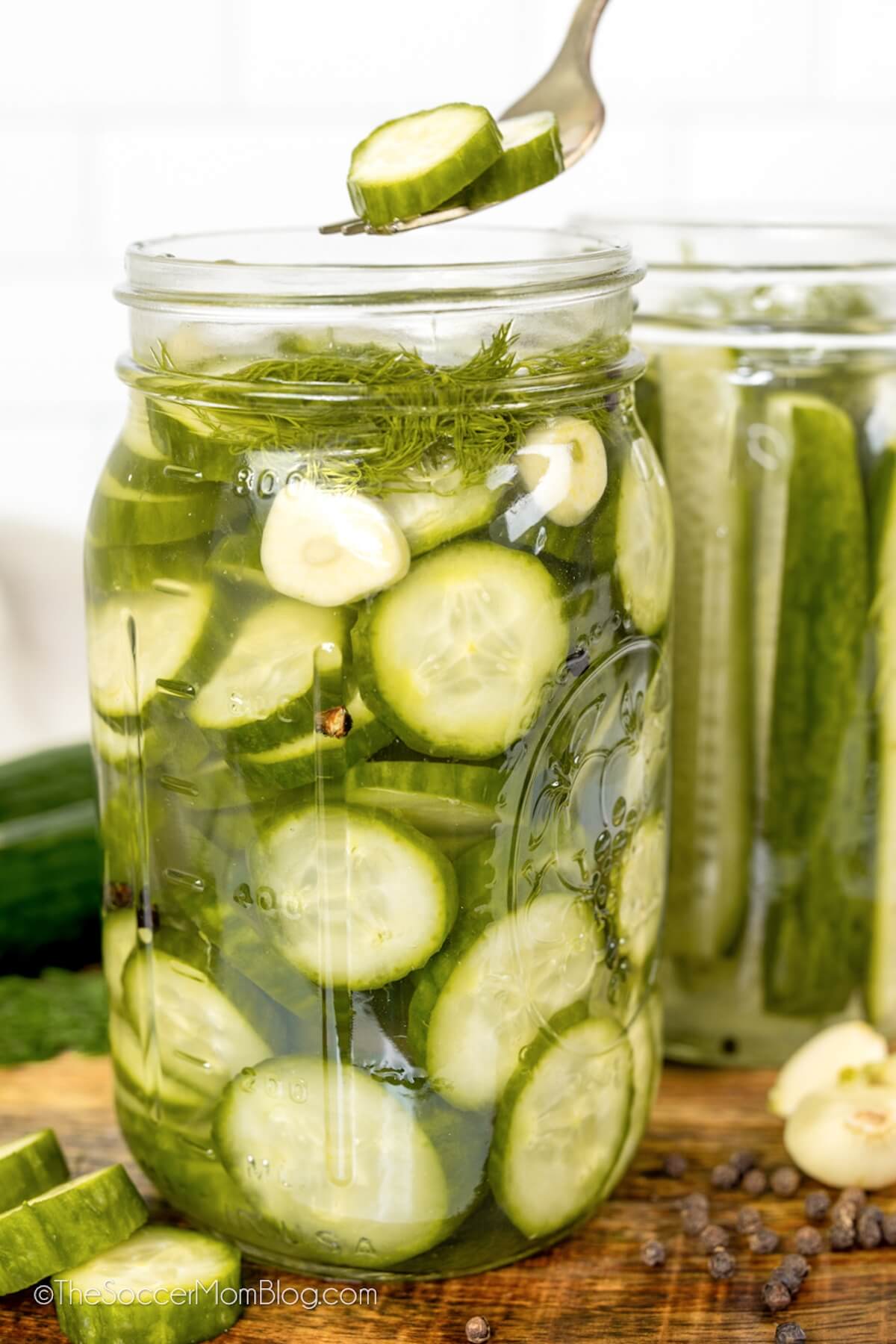
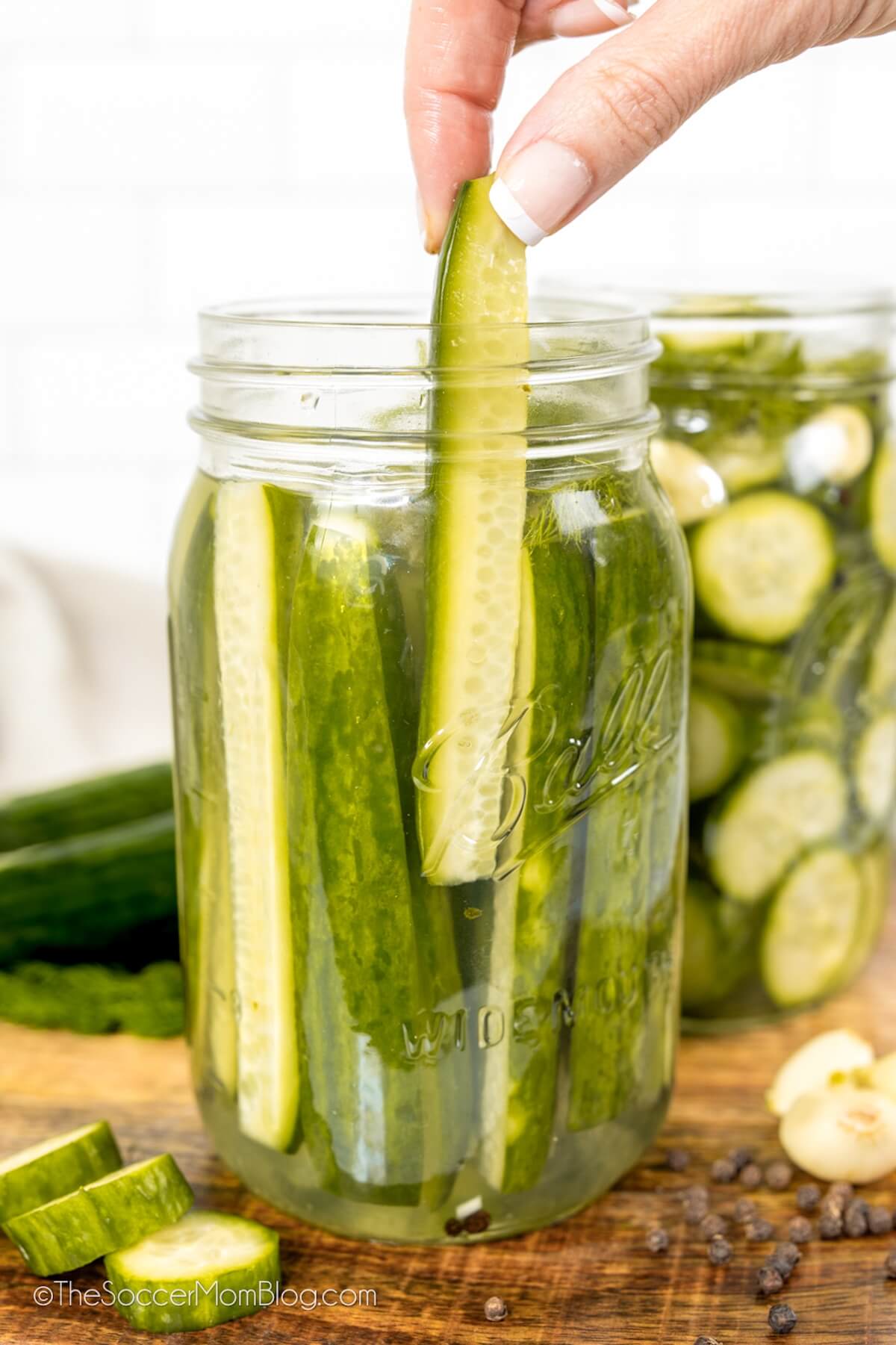
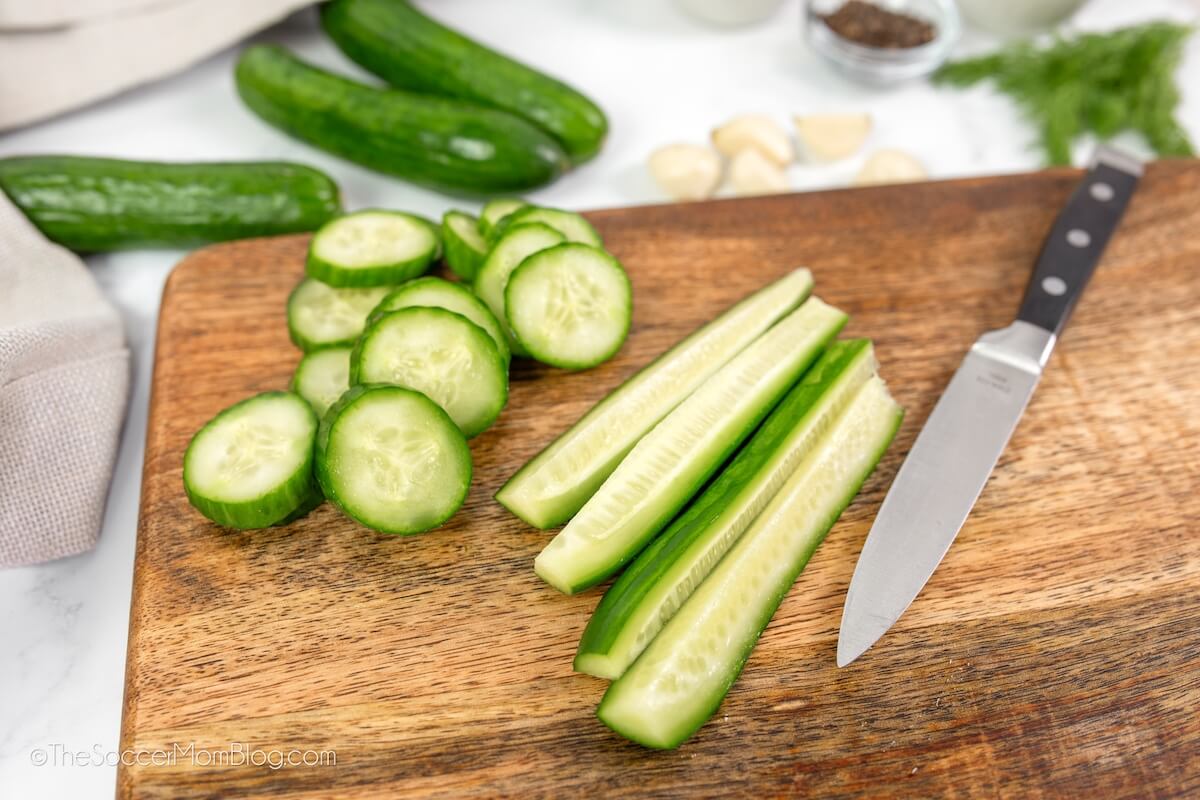
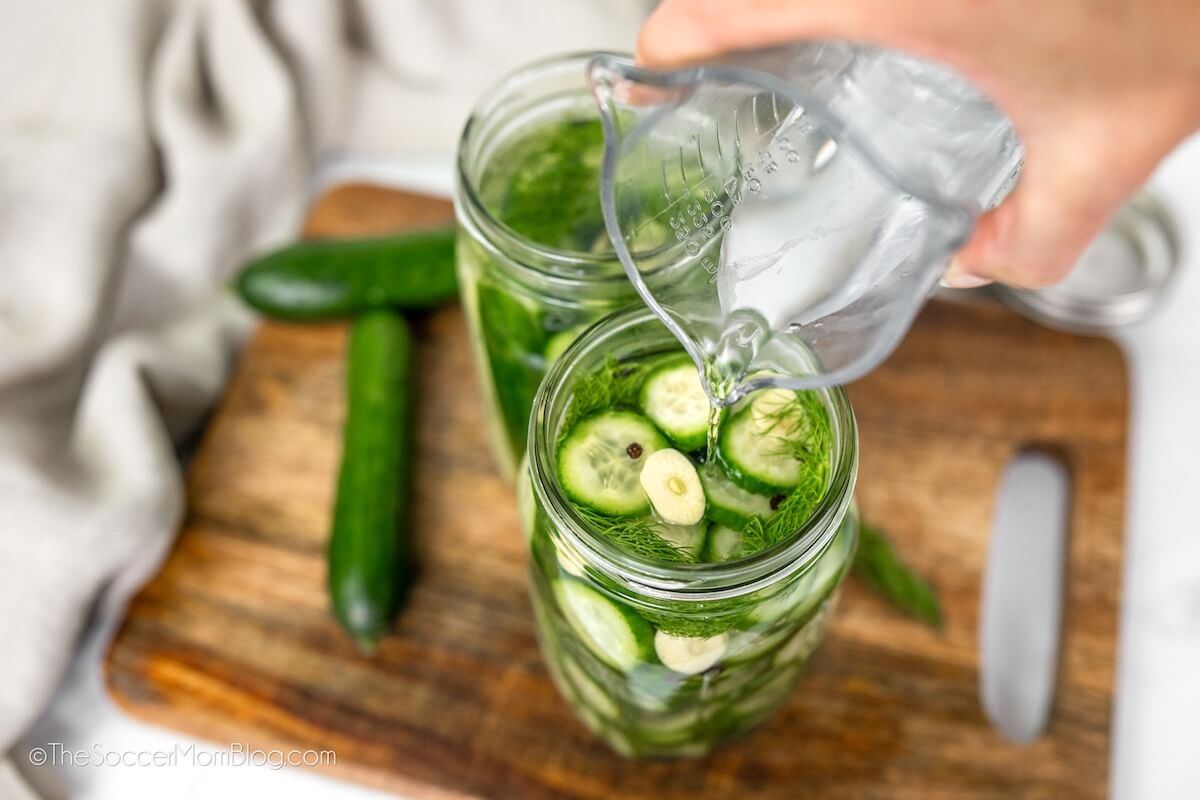
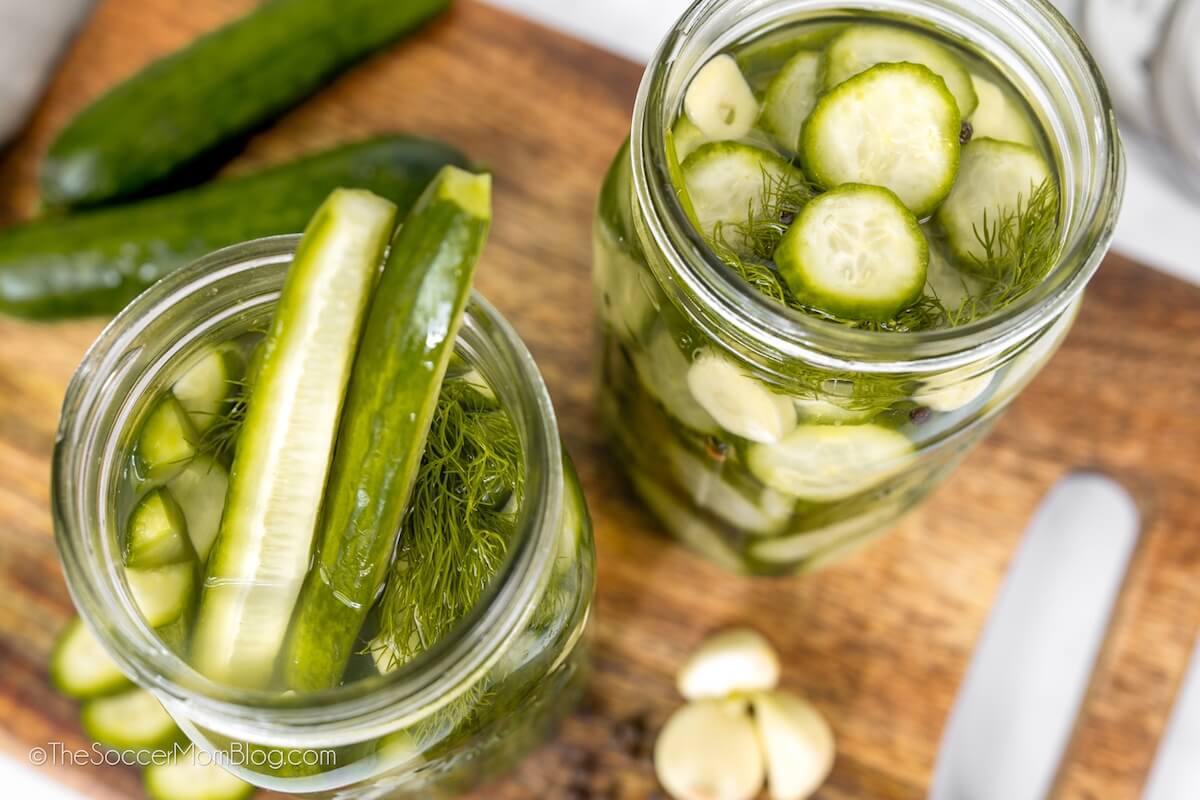
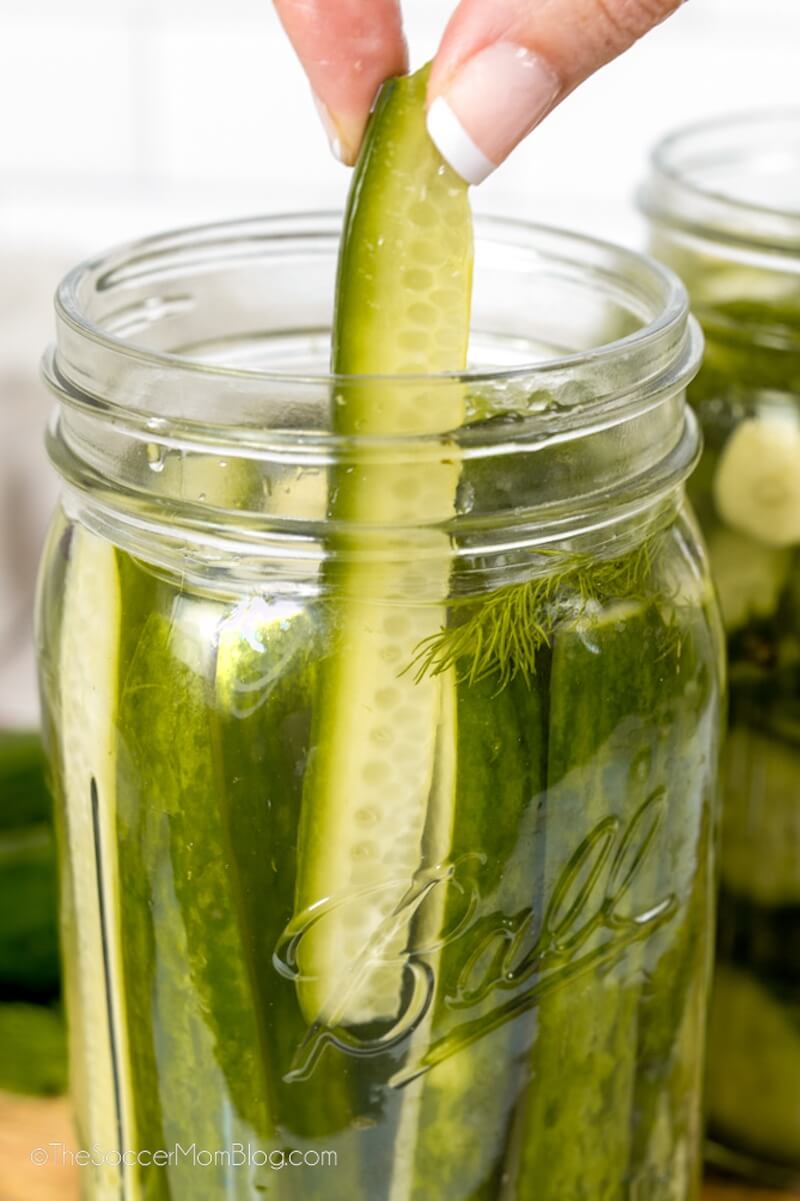
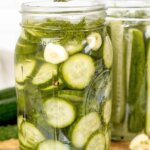
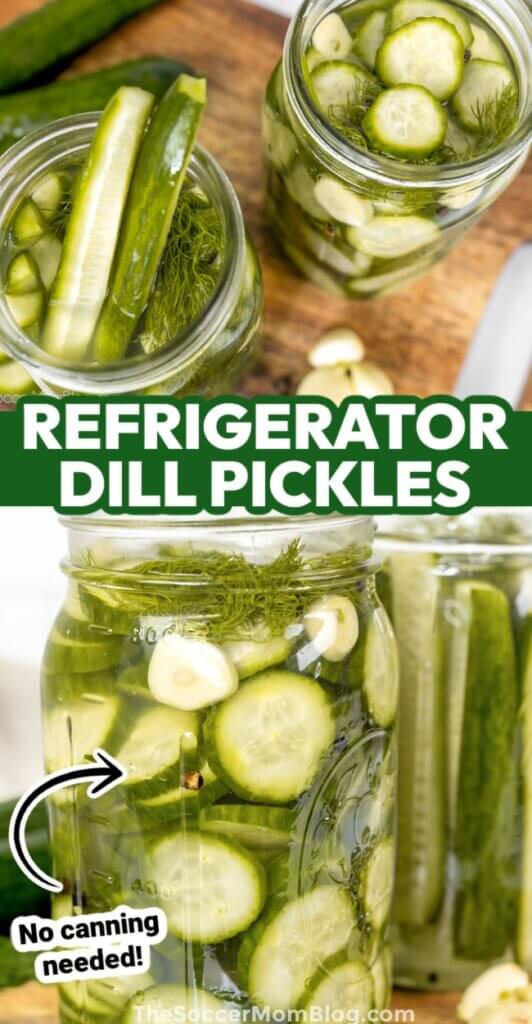
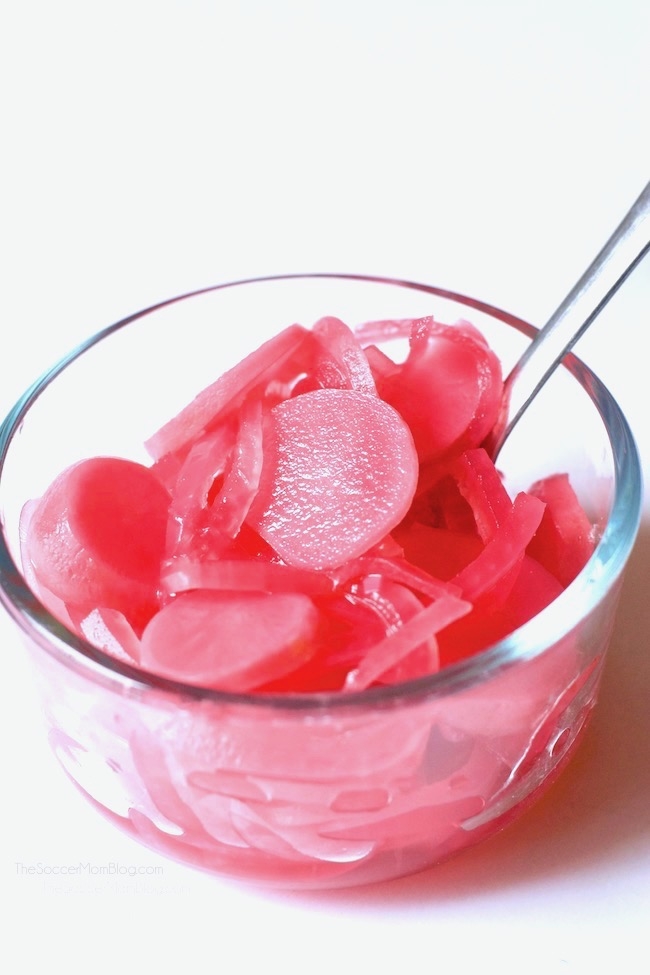
Debra says
I made these pickles, and they are amazing! Thank you so much for the lovely recipe!
Stacey aka the Soccer Mom says
So glad you loved them too! I made like 3 batches this summer!!
Laura Dittrich says
Can this recipe be made without the sugar?
Stacey aka the Soccer Mom says
I haven’t personally tried it, so I can’t say for sure how that would taste. I think the sugar helps temper the vinegar flavor a bit.